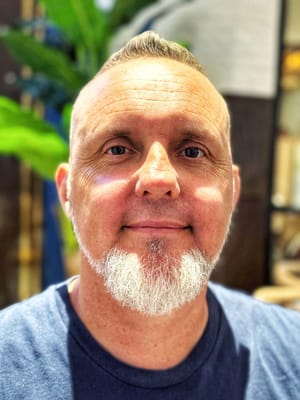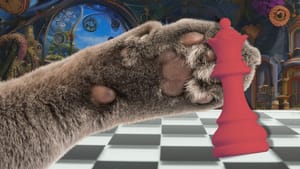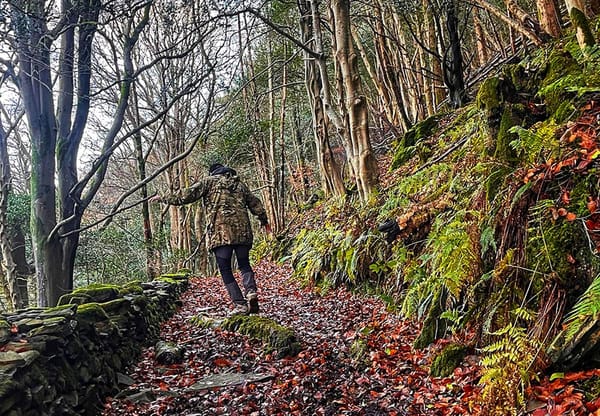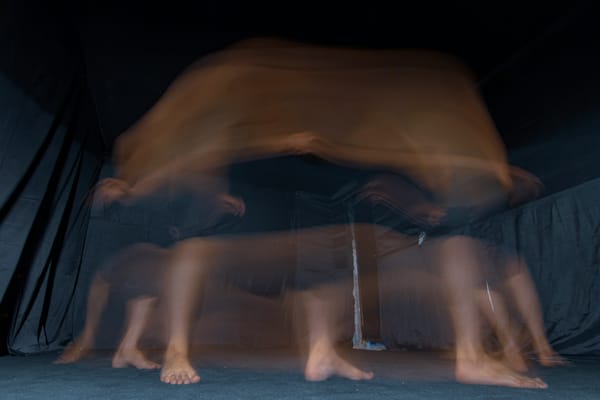I've been walking the same path for months now. No headphones. At times barefoot. Always alone.
It started as an escape from screens, notifications, and the peculiar exhaustion of perpetually being online. But somewhere between the first step and the thousandth, it became something else, a ritual, a remembering.
We live in strange days. While you read this, an AI is writing love letters, business strategies, therapy scripts. It's composing symphonies and painting dreams. This isn't science fiction. Just another day Living in the Absurd. We swim in synthetic realities, each one more perfectly tailored to our desires than the last.
And yet.
What happens to the human soul when we forget how to touch what is real?
I don't mean this romantically. I mean it philosophically, urgently, in the way Merleau-Ponty meant it when he wrote about the lived body, or how Heidegger spoke of dwelling. Here dwelling or Wohnen (in German) is more than having a roof over our heads or an address to call home. It's about how we truly inhabit our lives, the way we sink roots into a place, open ourselves to what surrounds us, and create spaces where our souls can breathe. To dwell is to belong somewhere, not just physically but in the deepest sense of finding our place in the world. The ancient Greeks had a word: anamnesis, unforgetting. Not learning something new, but remembering what was always there. That's what I'm after. Not progress, but a return to what I refer to as ‘natural wisdom’.
But…what happens when we become strangers to our sentient existence? When our primary relationship with reality is mediated through glass screens and algorithmic interpretations?
The Poverty of Optimisation
Everyone wants to optimise these days. Optimise their morning routine, optimise their sleep, and apparently optimise their soul in seven easy steps.
But what if the truest act of rebellion isn't to upgrade but to slow down? What if resistance looks less like innovation and more like embodied inhabitation?
I'm not here to rage against technology. That ship has sailed, and I'm typing this on a laptop anyway. But I am here to resist disembodiment. To push back against the hollowing that happens when we outsource our interiority to feeds, to metrics, to the endless scroll.
The philosopher Byung-Chul Han writes about the "tiredness of exhaustion" versus the "tiredness of deep attention." One drains us; the other replenishes us. But replenishment requires something our culture deems almost obscene: inefficiency. Presence without purpose. Time without optimisation.
This is where ritual comes in. Not ritual as Instagram-worthy performance. Not ritual as spiritual bypassing or another thing to consume, to perfect, to showcase.
Ritual is remembering our natural wisdom.
A ritual, at its essence, is a repeated act done with presence. It's what happens when we stop treating time as a resource to be mined and start treating it as a medium to inhabit. It's embodied philosophy, lived poetry, prayer without words.
In her luminous essay ‘The Writing Life,’ Annie Dillard tells us: "How we spend our days is, of course, how we spend our lives." Ritual is how we reclaim our days from the machinery of productivity. It's how we remember that we are not users or consumers but living creatures, breathing, feeling, wondering beings.
The (Un)New
I call them (Un)New Rituals because they aren't invented. They're remembered.
Walking without destination. Sitting without agenda. Listening without response. Touching earth with bare skin. Watching light change. Following the moon's phases not through an app but through the simple act of looking up.
These aren't novel. Our ancestors would laugh at calling them rituals, they would just call them living. But that's precisely why they feel revolutionary now. In a world obsessed with the new, the next, the now, returning to the eternal feels like the ultimate disruption.
These rituals as expressions of our innate natural wisdom don't optimise. It attunes.
This is what we've forgotten: that being human might be less about becoming and more about being. Less about solving ourselves and more about inhabiting ourselves.
The Stoics knew this. Marcus Aurelius, writing by candlelight between military campaigns, reminded himself daily to live according to nature, kata physin. Not the romanticised nature of pastoral fantasy, but the deep nature of what we are: finite beings capable of infinite attention. This captures the paradox that while we are limited creatures (finite in time, space, body), our capacity for attention, for presence, awareness, deep focus, feels limitless in its depth, if not its duration.
As such, here's what I've learned: the best rituals aren't designed. They emerge.
Maybe it starts with walking the same route each morning, noticing how the light shifts with seasons. Maybe it's sitting with your coffee for five minutes before checking your phone, just sitting, just tasting. Maybe it's writing three pages by hand each morning, not for anyone to read, just to let the interior speak.
These aren't life hacks. They're life anchors.
They don't promise transformation in 30 days. They promise something more radical: the possibility of being present to your own existence. Of remembering what skin feels like against wind. What silence sounds like when it's not waiting to be filled. What thoughts arise when they're not immediately captured, tagged, shared.
The Real Rebellion
While everyone else is building faster systems, I'm interested in building slower selves.
While culture trains us to worship efficiency, I'm learning to court inefficiency like a lover.
While the world asks us what we're achieving, I'm asking who we are becoming, or better yet, who we have always been beneath the acceleration.
This isn't nostalgia. I don't want to return to some imagined golden age. I want to live fully in this age, but with roots. With rituals that remind me I am not a brand, not a platform, not a series of optimised outcomes. I am weather and flesh, breath and bone, a brief arrangement of atoms lucky enough to wonder.
The Invitation
Over the coming months, I'll be sharing some of these (Un)New Rituals. Simple ones. Tech-free ones. Rituals that cost nothing but embodied attention.
They won't require apps or equipment or expertise. They'll just require showing up. Being willing to be inefficient, unproductive, gloriously unoptimised for a few minutes each day.
The first one begins with a walk. Of course it does. All philosophy begins with walking, ask Aristotle's peripatetics, Kant on his daily route through Königsberg, Thoreau circling Walden Pond.
But this walk is different. This walk doesn't go anywhere. It doesn't track steps or burn calories or clear your head for better productivity.
This walk just walks. And in walking, remembers what it means to move through the world as a body, as a being, as something magnificently more than code.
I'm writing this as we enter summer on the Isle of Man. The Earth is doing its ancient ritual of abundance, no optimisation required. Everything simply grows because that's what life does in the heat and light.
Maybe that's the deepest ritual of all: learning to live in time with time. Not clock time, not screen time, but earth time. Body time. Soul time. The machines will keep accelerating. The synthetic will keep proliferating. The algorithms will keep learning to be more perfectly us, than we are.
But we still have a choice. We can still carve out moments, rituals, where we remember what it has always meant to be human. Where we refuse the poverty of perpetual optimisation and choose instead the wealth of presence. Where we walk barefoot. Breathe deeply. Sit still. Listen softly. Where we live lives that don't need to be uploaded to be real.
Because at it’s heart natural wisdom was never lost. It's just been waiting, patient as stone, gentle as rain, for us to come home. And home, it turns out, was always just a ritual away.
P.S. Just to be clear, this isn't some utopian call to abandon civilisation and live in a cave. Though honestly, have you seen cave paintings? Those ancestors knew something about presence we've forgotten. No, this is simpler and more complex. It's the recognition that as the world speeds up, we need practices that slow us down. As reality becomes more synthetic, we need rituals that return us to the actual. Not because the old ways were better. But without them, we risk forgetting that we are not machines dreaming we are human. And it's time to wake up.
Coaching Philosophia is a reader-supported space. If my work speaks to you, consider subscribing—free or paid. If a subscription’s not right for you, a one-time coffee is always deeply appreciated. ☕❤️










Member discussion